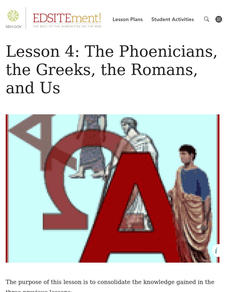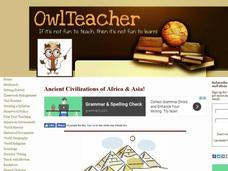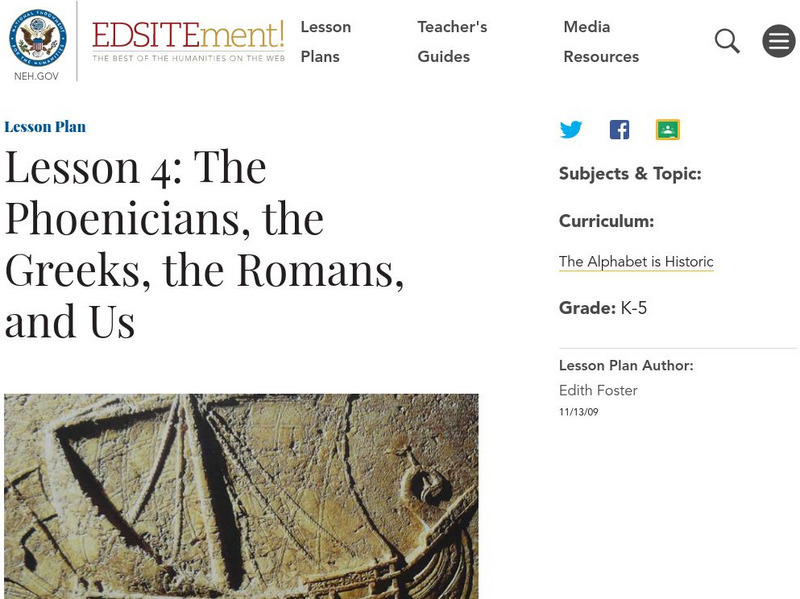National Endowment for the Humanities
The Greek Alphabet: More Familiar Than You Think!
In this Greek alphabet lesson, pupils explore the Phoenician origins to the Greek alphabet. Learners compare Greek letters to current letters and write a paragraph about the life of young scholars in ancient Greece. They also identify...
National Endowment for the Humanities
Lesson 4: The Phoenicians, the Greeks, the Romans, and Us
Learners review knowledge gained in the three-part unit on the history of the alphabet. Using maps and images, learners consolidate their understanding of ancient Greece, the Romans and the Phoenicians, and their respective impacts on...
Curated OER
The Phoenicians and the Beginnings of the Alphabet
Students research the history of the alphabet and the Phoenician people. In this alphabet history instructional activity, students view images of Phoenician ships and discuss their trading abilities. Students view various locations on a...
Curated OER
The Alphabet is Historic: The Roman Alphabet is our Alphabet
Learners show that the Greeks, Phoenicians and Romans lived in the Mediterranean area. They give reasons why the alphabet was important for the Romans. and say that the Romans developed the alphabet they are learning in school.
Curated OER
The Phoenicians
Introduce the ancient culture of the Phoenicians to your class. They'll find out that the Phoenicians were sailors, adopted hieroglyphics from Egypt, traded goods, and had colonies. Comprehension questions are included to build strong...
Curated OER
The Phoenicians
In this Phoenicians worksheet, students read a 4-page selection about Phoenician culture and then respond to 2 short answer questions based on the selection.
Curated OER
The Alphabet is Historic
Young scholars describe how the Phoenicians, Greeks and Romans passed down the alphabet through the generations. They compare and contrast the letters from early alphabets to the one of today and discuss how they are different. Using a...
Curated OER
The Persians and the Phoenicians
Seventh graders take notes on a teacher lecture and PowerPoint presentation on the rise of the Persian and Phoenician Civilizations. They compare the Phoenician alphabet with our alphabet. They use the Phoenician alphabet to write a...
Owl Teacher
Teach Ancient Civilizations: Africa
Amazing! Teach learners about the wonders of ancient Africa and Asia with a comprehensive set of teaching tools. You'll click to find a well-constructed presentation, a worksheet that has kids compare and contrast ancient alphabets, a...
Curated OER
PEOPLE OF THE FERTILE CRESCENT
Students evaluate how technology changed life in Mesopotamia. Students summarize the link between agriculture and religion in Sumer. Students classify the Sumerians according to social classes. Students classify the causes and effects...
Curated OER
Applications of Cargoes from Three Continents to the Latin Classroom
Students discuss the importance of communication and writing in their daily lives. In groups, they use the internet to research the development of letters, alphabets and writing materials. They trace the spread of the Latin language...
Curated OER
Ancient Greece
In this ancient Greece worksheet, students read a factual story giving the basic history of the Minoans and Mycenaeans. Students answer 8 questions.
Curated OER
Chapter 12 Writing: the ABCs of Language
Providing a thorough presentation on the art of written language (and not just English), this slideshow will open your students' eyes to the sociological and linguistic issues surrounding writing systems, both modern and historical. The...
Curated OER
The History of Writing
The history of written communication can be an interesting addition to history lessons.
Phonecian Encyclopedia
A Bequest Unearthed, Phoenicia: The Phoenician Alphabet
History of the Phoenician alphabet and how it was adopted by the Greeks. Examples are shown including a graphical chart. You can also download a Phoenician typeface.
National Endowment for the Humanities
Neh: Edsit Ement: The Alphabet Is Historic
Great lesson plans for grades K-2 on the history of the alphabet. Includes guiding question, objectives, and four lessons with activities and assessments. With links to various websites containing information on alphabet history.
Phonecian Encyclopedia
Encyclopedia Phoeniciana: The Phoenician Alphabet
Both fun and informative, this rich site from the Encyclopedia Phoeniciana explains the importance of the Phoenician alphabet for the development of world languages. Download a Phoenician font for yourself!
Phonecian Encyclopedia
Encyclopedia Phoeniciana: Table of Phoenician Alphabet
This site from the Encyclopedia Phoeniciana provides an excellent chart comparing Phoenician letters and meanings with the modern (Latin) alphabetic equivalents. Explains the history of how each phonetic meaning has shifted over time.
National Endowment for the Humanities
Neh: Edsit Ement: Lesson 1: The Phoenicians and the Beginnings of the Alphabet
In this lesson plan, students will consider Lesson 1: The Phoenicians and the Beginnings of the Alphabet. Worksheets and other supporting materials can be found under the Resources tab.
Stephen Byrne
History for Kids: Greek Alphabet
History for Kids tells about the history of the Greek alphabet and provides interactive set of alphabet examples with audio pronunciation. Site includes teacher materials.
National Endowment for the Humanities
Neh: Edsit Ement: Lesson 4: The Phoenicians, the Greeks, the Romans, and Us
In this lesson plan, students will consider Lesson 4: The Phoenicians, the Greeks, the Romans, and Us. Worksheets and other supporting materials can be found under the Resources tab.
National Endowment for the Humanities
Neh: Edsit Ement: Lesson 3: The Roman Alphabet Is Our Alphabet
For this lesson plan, students will consider Lesson 3: The Roman Alphabet is our Alphabet. Worksheets and other supporting materials can be found under the Resources tab.
Other
The History of Writing
This explanation of the history of writing traces writing from the use of "Counting tokens," to the development of the Roman alphabet. The pictures of how writing has progressed over time is very interesting and helpful.
Phonecian Encyclopedia
Encyclopedia Phoeniciana: Picture Writing to Alphabet
This site, from the Encyclopedia Phoeniciana, presents a comprehensive chart that shows the gradual development of different world languages from primitive scripts.

























